A doksi online olvasásához kérlek jelentkezz be!
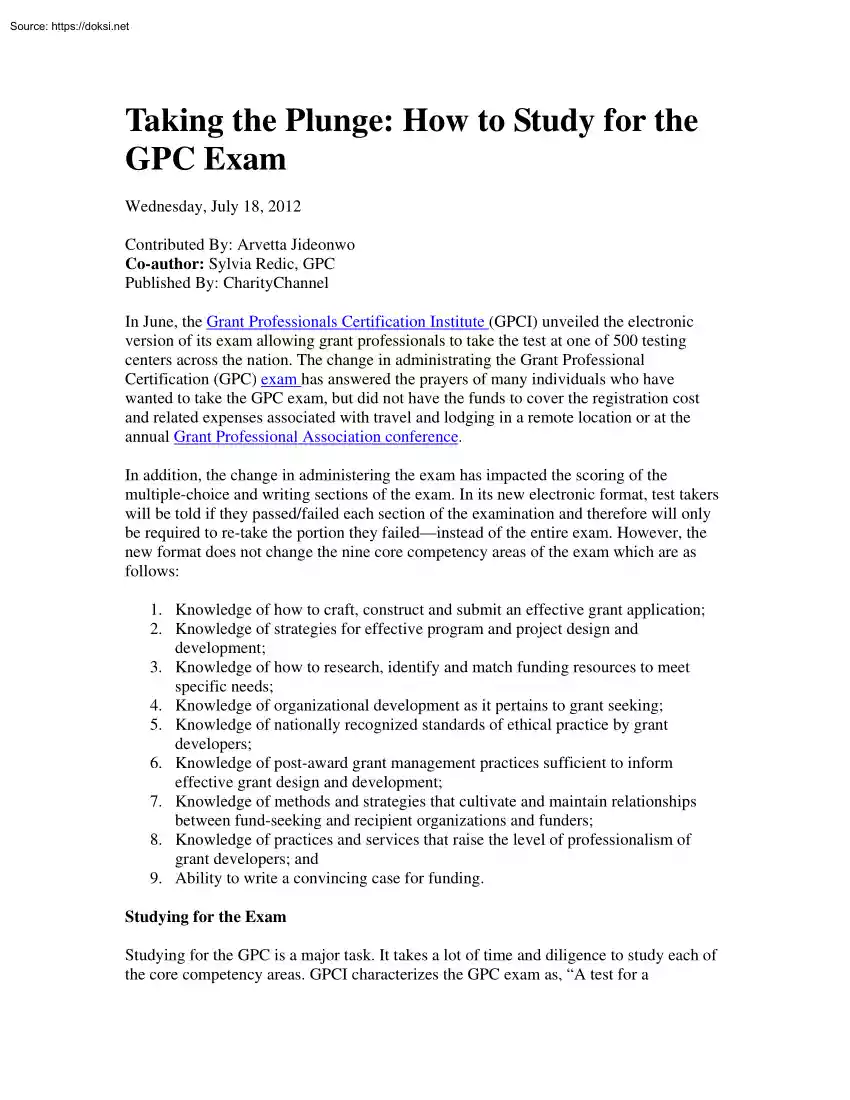
A doksi online olvasásához kérlek jelentkezz be!
Nincs még értékelés. Legyél Te az első!
Mit olvastak a többiek, ha ezzel végeztek?
Tartalmi kivonat
Taking the Plunge: How to Study for the GPC Exam Wednesday, July 18, 2012 Contributed By: Arvetta Jideonwo Co-author: Sylvia Redic, GPC Published By: CharityChannel In June, the Grant Professionals Certification Institute (GPCI) unveiled the electronic version of its exam allowing grant professionals to take the test at one of 500 testing centers across the nation. The change in administrating the Grant Professional Certification (GPC) exam has answered the prayers of many individuals who have wanted to take the GPC exam, but did not have the funds to cover the registration cost and related expenses associated with travel and lodging in a remote location or at the annual Grant Professional Association conference. In addition, the change in administering the exam has impacted the scoring of the multiple-choice and writing sections of the exam. In its new electronic format, test takers will be told if they passed/failed each section of the examination and therefore will only be required
to re-take the portion they failedinstead of the entire exam. However, the new format does not change the nine core competency areas of the exam which are as follows: 1. Knowledge of how to craft, construct and submit an effective grant application; 2. Knowledge of strategies for effective program and project design and development; 3. Knowledge of how to research, identify and match funding resources to meet specific needs; 4. Knowledge of organizational development as it pertains to grant seeking; 5. Knowledge of nationally recognized standards of ethical practice by grant developers; 6. Knowledge of post-award grant management practices sufficient to inform effective grant design and development; 7. Knowledge of methods and strategies that cultivate and maintain relationships between fund-seeking and recipient organizations and funders; 8. Knowledge of practices and services that raise the level of professionalism of grant developers; and 9. Ability to write a convincing case for
funding Studying for the Exam Studying for the GPC is a major task. It takes a lot of time and diligence to study each of the core competency areas. GPCI characterizes the GPC exam as, “A test for a ‘generalist’ who is defined in broad terms as a person who is experienced and competent in the fundamentals of grantsmanship.” GPCI further explains that the test measures an individual’s ability to provide ethical quality grant-related services. The certification has gained increased recognition and the GPCI believes that it will continue to build professional momentum as a sought after credential among grant professionals. If this certification is an achievement goal for you as grant professional, the question may now be, “How do I study for the exam?” The skill of writing grants develops differently for each individual. Several factors play a key role in these differences including their specialized fields (e.g different levels of educational institutions, medical
programs and research, and the wide array of non-profit organizations) and the different types of grant funding available (e.g local, state and federal government programs as well as private and public foundations). As indicated, the GPC exam is not based on theories. It is a generalist testwhich makes it even more difficult to study for, because it’s based on real-world context. Furthermore, as widely known, the exam was developed by subject matter experts in the grants field and is specific to real-life scenarios and situations that would typically occur within the non-profit arena. As a “generalist” test, it has been designed to capture knowledge that crosses a wide variety of specialties and a large body of information. Preparing to sit for such a challenging examination can be very intimidating. In general, it’s advised that each examinee review the nine core competency areas. I’ve practiced in the field for 15 years now. When I (Arvetta Jideonwo) studied for the GPC
exam, I worked with a group of six people over a three-month time period to prepare for the exam. Together, we simply reviewed each section and asked each individual what they would do in a particular situation. We learned each section in detail and quizzed each other over the core competencies. Words of Advice But successful approaches to studying for the exam are varied. In an effort to help shed some light on preparation practices, we asked other grant professionals to chime in and share their approach to the exam. Amy Shankland, a government grant professional, has significant experience in developing federal grants for city government. She felt it was essential to study hard for the GPC to refresh her working knowledge of the general grant principles. Ms Shankland attended several study sessions held by her local chapter and accessed official study guides developed by local GPA chapters to prepare for the exam. She felt confident and well-prepared to take the exam in the spring of
2010. She indicated that, it was very helpful to bounce ideas off of other grant professionals in the sessions about each of the core competency areas. Ms Shankland recommends taking advantage ofresources such as these before taking the GPC. Lynne Mullen, grant consultant, has experience with many types of grants and is wellversed in many different competences. Achieving the certification was a personal and professional goal for her. Ms Mullen took a collaborative approach to studying and formed a small study group of about five people. While the group members were all working in grant-related services, the members were not all taking the test; some had merely chosen to participate as a refresher course for their work. The group met regularly and even created homework assignments for themselves. During the actual exam, Ms Mullen specifically recalls certain questions that she was more prepared to answer because of the study group experience. She explained, “Even though I knew the
information, studying put it in the forefront of my mind and when I took the test, it was fresh in my memory.” Ms Mullen advises anyone interested in taking the exam to study and suggests that study discussion is particularly beneficial. Nancy Smallwood, government grant professional, also felt that that preparation was necessary not only to refresh her working knowledge but also to supplement her experience with information about which she was not familiar. However, her approach was different from Ms. Mullen as she chose to identify books from the Grant Professionals Association National Chapter’s recommended study list and study without the benefit of a group. Ms Smallwood asked a few questions of fellow grant professionals about which books were strong choices. She identified materials that focused on competences outside her career experience. When asked if she felt the studying had been valuable to the actual examination Ms. Smallwood stated, “I don’t know if I would have
passed” without studying. She went on to say that even if you have a lifetime of experience across all competences, studying still refreshes details and specifics. Kimberly Hays de Muga, non-profit grant writer, also chose an independent study method. She was able to locate the books in the local library that enabled her to acquaint herself with competency areas with which she has the least experience. Ms Hays de Muga does recommend studying as an effective refresher tool but cautions against only learning what is in a study guide. She states that while study guides can be useful and can support what you already know, only learning what is in the study guide might not be the wisest choice because the exam is more about an individual’s cumulative years of experience. Ms Hays de Muga also advises anyone considering sitting for the exam to devise a system for studying. She states that the real value in studying is to help understand your professional strengths and weaknesses. Once you
understand your weaknesses, your study can be focused on these particular areas. Sylvia Redic, government grant professional, indicates that she chose not to study. Ms Redic felt that the information was so vast and diverse that the effort to study would be futile. She thought that if her experience had not prepared her, then she would know when the test results came back and at that point, she would think about study methods. However, she confesses that there were moments during the test when she thought, “Man, not studying was not smart.” Sylvia concluded that, the generalist exam covered some areas of unfamiliarity because she is a government grant professional. She indicated that even questions geared toward government related topics challenged her memory. Even though she was able to pass the exam without studying, she would not recommend the approach for everyone and wished she would have studied and utilized a more collaborative approach. In Summary In general, the common
theme among the interviewed grant professionals is that a collaborative approach is critical to successfully studying for the GPC exam. While grant professional have used different study strategies, reports consistently suggest that: (1) Studying is a good tool for refreshing the knowledge you already possess; (2) The best use of studying is to focus on the areas with which you are the least familiar; and, (3) Review information about your weakest areas with fellow colleagues for consensus and collaboration. As you prepare for the exam choose a course of action. Decide it you are going to study Then decide which study strategy you will use and which information will you focus upon. Whatever method you choose, or if you choose not to study and rely solely on personal and professional experience, I hope your endeavor proves successful. Remember that the test’s conversion to an electronic format did not change the core content areas of the examjust how the exam is administered and
scored. By making the test more accessible, the new format is designed to encourage all grant professionals to sit for the exam and to take the essential steps required to join their fellow colleagues in earning their GPC credential. The value of the GPC credential is becoming more recognized across all grant-related services and among those organizations seeking to employ grant professionals. So go ahead, “Take the Plunge” in taking the exam and join the ranks of nearly 400 grant professionals nationwide who’ve earned the GPC credential. Special note of appreciation: We would like to specifically recognize grant professionals, Kimberly Hays de Muga, Lynne Mullen, Amy Shankland, and Nancy Smallwood who contributed to the writing of this article. Note: Over the years, several study guides have been developed for the GPC exam.As indicated on the GPCI website (www.grantcredentialorg), the Grant Professional Association has a study guide available for
sale in its online store that covers the core competencies in specific detail. Please note that this study guide is not a requirement for taking the examnor is this an endorsement of the materials themselves
to re-take the portion they failedinstead of the entire exam. However, the new format does not change the nine core competency areas of the exam which are as follows: 1. Knowledge of how to craft, construct and submit an effective grant application; 2. Knowledge of strategies for effective program and project design and development; 3. Knowledge of how to research, identify and match funding resources to meet specific needs; 4. Knowledge of organizational development as it pertains to grant seeking; 5. Knowledge of nationally recognized standards of ethical practice by grant developers; 6. Knowledge of post-award grant management practices sufficient to inform effective grant design and development; 7. Knowledge of methods and strategies that cultivate and maintain relationships between fund-seeking and recipient organizations and funders; 8. Knowledge of practices and services that raise the level of professionalism of grant developers; and 9. Ability to write a convincing case for
funding Studying for the Exam Studying for the GPC is a major task. It takes a lot of time and diligence to study each of the core competency areas. GPCI characterizes the GPC exam as, “A test for a ‘generalist’ who is defined in broad terms as a person who is experienced and competent in the fundamentals of grantsmanship.” GPCI further explains that the test measures an individual’s ability to provide ethical quality grant-related services. The certification has gained increased recognition and the GPCI believes that it will continue to build professional momentum as a sought after credential among grant professionals. If this certification is an achievement goal for you as grant professional, the question may now be, “How do I study for the exam?” The skill of writing grants develops differently for each individual. Several factors play a key role in these differences including their specialized fields (e.g different levels of educational institutions, medical
programs and research, and the wide array of non-profit organizations) and the different types of grant funding available (e.g local, state and federal government programs as well as private and public foundations). As indicated, the GPC exam is not based on theories. It is a generalist testwhich makes it even more difficult to study for, because it’s based on real-world context. Furthermore, as widely known, the exam was developed by subject matter experts in the grants field and is specific to real-life scenarios and situations that would typically occur within the non-profit arena. As a “generalist” test, it has been designed to capture knowledge that crosses a wide variety of specialties and a large body of information. Preparing to sit for such a challenging examination can be very intimidating. In general, it’s advised that each examinee review the nine core competency areas. I’ve practiced in the field for 15 years now. When I (Arvetta Jideonwo) studied for the GPC
exam, I worked with a group of six people over a three-month time period to prepare for the exam. Together, we simply reviewed each section and asked each individual what they would do in a particular situation. We learned each section in detail and quizzed each other over the core competencies. Words of Advice But successful approaches to studying for the exam are varied. In an effort to help shed some light on preparation practices, we asked other grant professionals to chime in and share their approach to the exam. Amy Shankland, a government grant professional, has significant experience in developing federal grants for city government. She felt it was essential to study hard for the GPC to refresh her working knowledge of the general grant principles. Ms Shankland attended several study sessions held by her local chapter and accessed official study guides developed by local GPA chapters to prepare for the exam. She felt confident and well-prepared to take the exam in the spring of
2010. She indicated that, it was very helpful to bounce ideas off of other grant professionals in the sessions about each of the core competency areas. Ms Shankland recommends taking advantage ofresources such as these before taking the GPC. Lynne Mullen, grant consultant, has experience with many types of grants and is wellversed in many different competences. Achieving the certification was a personal and professional goal for her. Ms Mullen took a collaborative approach to studying and formed a small study group of about five people. While the group members were all working in grant-related services, the members were not all taking the test; some had merely chosen to participate as a refresher course for their work. The group met regularly and even created homework assignments for themselves. During the actual exam, Ms Mullen specifically recalls certain questions that she was more prepared to answer because of the study group experience. She explained, “Even though I knew the
information, studying put it in the forefront of my mind and when I took the test, it was fresh in my memory.” Ms Mullen advises anyone interested in taking the exam to study and suggests that study discussion is particularly beneficial. Nancy Smallwood, government grant professional, also felt that that preparation was necessary not only to refresh her working knowledge but also to supplement her experience with information about which she was not familiar. However, her approach was different from Ms. Mullen as she chose to identify books from the Grant Professionals Association National Chapter’s recommended study list and study without the benefit of a group. Ms Smallwood asked a few questions of fellow grant professionals about which books were strong choices. She identified materials that focused on competences outside her career experience. When asked if she felt the studying had been valuable to the actual examination Ms. Smallwood stated, “I don’t know if I would have
passed” without studying. She went on to say that even if you have a lifetime of experience across all competences, studying still refreshes details and specifics. Kimberly Hays de Muga, non-profit grant writer, also chose an independent study method. She was able to locate the books in the local library that enabled her to acquaint herself with competency areas with which she has the least experience. Ms Hays de Muga does recommend studying as an effective refresher tool but cautions against only learning what is in a study guide. She states that while study guides can be useful and can support what you already know, only learning what is in the study guide might not be the wisest choice because the exam is more about an individual’s cumulative years of experience. Ms Hays de Muga also advises anyone considering sitting for the exam to devise a system for studying. She states that the real value in studying is to help understand your professional strengths and weaknesses. Once you
understand your weaknesses, your study can be focused on these particular areas. Sylvia Redic, government grant professional, indicates that she chose not to study. Ms Redic felt that the information was so vast and diverse that the effort to study would be futile. She thought that if her experience had not prepared her, then she would know when the test results came back and at that point, she would think about study methods. However, she confesses that there were moments during the test when she thought, “Man, not studying was not smart.” Sylvia concluded that, the generalist exam covered some areas of unfamiliarity because she is a government grant professional. She indicated that even questions geared toward government related topics challenged her memory. Even though she was able to pass the exam without studying, she would not recommend the approach for everyone and wished she would have studied and utilized a more collaborative approach. In Summary In general, the common
theme among the interviewed grant professionals is that a collaborative approach is critical to successfully studying for the GPC exam. While grant professional have used different study strategies, reports consistently suggest that: (1) Studying is a good tool for refreshing the knowledge you already possess; (2) The best use of studying is to focus on the areas with which you are the least familiar; and, (3) Review information about your weakest areas with fellow colleagues for consensus and collaboration. As you prepare for the exam choose a course of action. Decide it you are going to study Then decide which study strategy you will use and which information will you focus upon. Whatever method you choose, or if you choose not to study and rely solely on personal and professional experience, I hope your endeavor proves successful. Remember that the test’s conversion to an electronic format did not change the core content areas of the examjust how the exam is administered and
scored. By making the test more accessible, the new format is designed to encourage all grant professionals to sit for the exam and to take the essential steps required to join their fellow colleagues in earning their GPC credential. The value of the GPC credential is becoming more recognized across all grant-related services and among those organizations seeking to employ grant professionals. So go ahead, “Take the Plunge” in taking the exam and join the ranks of nearly 400 grant professionals nationwide who’ve earned the GPC credential. Special note of appreciation: We would like to specifically recognize grant professionals, Kimberly Hays de Muga, Lynne Mullen, Amy Shankland, and Nancy Smallwood who contributed to the writing of this article. Note: Over the years, several study guides have been developed for the GPC exam.As indicated on the GPCI website (www.grantcredentialorg), the Grant Professional Association has a study guide available for
sale in its online store that covers the core competencies in specific detail. Please note that this study guide is not a requirement for taking the examnor is this an endorsement of the materials themselves
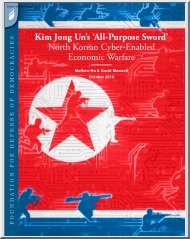
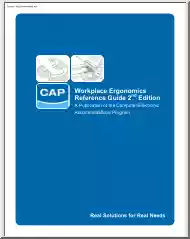
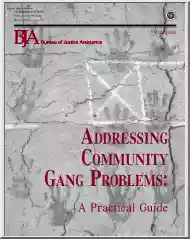
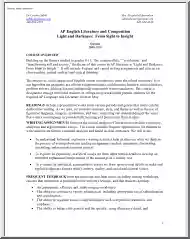
 Írásunkban a műelemzések készítésének módszertanát járjuk körül. Foglalkozunk az elemzés főbb fajtáival, szempontjaival és tanácsokat adunk az elemzés legfontosabb tartalmi elemeivel kapcsolatban is. Módszertani útmutatónk főként tanulók számára készült!
Írásunkban a műelemzések készítésének módszertanát járjuk körül. Foglalkozunk az elemzés főbb fajtáival, szempontjaival és tanácsokat adunk az elemzés legfontosabb tartalmi elemeivel kapcsolatban is. Módszertani útmutatónk főként tanulók számára készült!